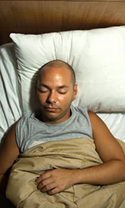What Is Sleep?

There was a time when people thought that sleep was simply a time when the body and brain “shut off” and idled for the night in preparation for the next day. But now scientists understand that neither the body nor the brain “shut down” when we sleep; in fact, they are actively, refining brain circuits, clearing metabolic waste products, repairing injury, growing bones and building muscles.
Circadian rhythm
Imagine you have a tiny clock inside your brain, consistently sending reminders to the rest of your body. This clock, called your circadian rhythm, runs on a roughly 24-hour cycle, like a day-night cycle inside you, even without any sun!
Think of the days light-dark cycle like a traffic signal for your body. Sunlight acts like the green light, telling your clock to speed up and make you energetic (like morning rush hour). When it's dark, the clock turns yellow and then red, slowing things down and making you sleepy (like bedtime).
This internal clock isn't just about sleep. It's a master timer for all of your body functions, controlling when you feel hungry, when your gut moves, making sure hormones are released at the right time and even helping you be at your creative peak when you sit down to write or think. When you have a healthy circadian rhythm it keeps everything running smoothly throughout the day and night.
So, the next time you feel a surge of energy in the morning or sleepiness at night, remember your tiny clock inside. It's just trying to keep your body in sync with the world around you. By understanding your circadian rhythm and respecting its cues, you can feel better and be more productive throughout the day. Abnormalities in the circadian rhythm can lead to sleep disorders like insomnia at night and excessive sleepiness during the day.
Stages of sleep

Sleep can be broadly categorized into two states: REM (Rapid Eye Movement) and non-REM (Non-Rapid Eye Movement). However, within non-REM sleep, there are actually further stages that offer a more nuanced understanding of how our sleep unfolds.
Non-REM Sleep:
- Stage 1 (Drowsiness): The lightest stage of sleep, hopefully lasting just a few minutes. You're easily awakened, and brain waves slow down slightly. You might experience hypnagogic jerks, those little twitches that feel like falling.
- Stage 2 (Light Sleep): For most adults, this stage makes up about 50% of our sleep. Brainwaves slow down further, heart rate and breathing become more regular, and muscles relax. It's a crucial period for memory consolidation and preparing for deeper sleep.
- Stage 3 (Deep Sleep): This is the "golden hour" of sleep, crucial for physical repair and restoration. Brainwaves become very slow and synchronized, muscles are relaxed, brain toxins are cleared out, and growth hormone surges, promoting tissue repair and immune function.
REM Sleep:
- REM (Rapid Eye Movement): This stage, despite making up only about 20% of sleep in adults (children have a lot more), is characterized by brain activity very similar to wakefulness. Your eyes dart rapidly behind closed lids, and you experience vivid, often weird, dreams. REM sleep is vital for brain development, emotional processing, memory consolidation, and creativity.
Throughout the night, we cycle through these stages multiple times, with the duration of each stage changing as the night progresses. Early on, we spend more time in deep sleep, while REM sleep becomes more prominent in the later hours. This intricate dance ensures all our physical and mental needs are met during sleep.
Why do we need sleep?
A lot is still unknown about the purpose of sleep. However, it’s widely accepted that there isn’t just one explanation for why we need to sleep. Sleep clearly serves many biological functions.
- Offers the body a chance to recover from wear and tear of daily life. Many researchers have suggested the restorative effects of sleeping. This doesn’t just mean that the body rests during sleep—rather, the cells busily regenerate themselves and the body temperature, heart rate, and breathing drop in order to conserve energy.
- Muscles and bone growth. If you have children, have you ever thought they grew taller at night? Guess what You are correct. Sleep Is when we release Growth Hormone critical for healthy bones, muscles and metabolic health.
- Facilitates learning & memory. Not only do you need rest to sustain the attention and concentration necessary to learn new tasks, but according to Harvard’s Division of Sleep Medicine, sleep is a time for the brain to consolidate memories, which makes learning new things easier. People who sleep after learning how to play a video game generally perform much better in the game later than those who stay awake. This role can help you: learn a new language, master a musical instrument, or play a better game of golf.
- Plays a role in boosting your immune system. Your body produces special proteins called cytokines, which help your immune system fight off infection. More of these proteins are produced during sleep when you are sick, which is one of the reasons you may feel so tired when you have the flu. Rest gives the body the time it needs to produce these infection-fighting proteins and to restore itself to wellness.
Alcohol and sleep
While many people believe that having a drink will help them get to sleep faster, alcohol actually increases the number of times you awaken during the night, leaving you tired and sleep-deprived the next day.
References:
Kirsten Nunez, Karen Lamoreux, 20 June 2023, What is the Purpose of Sleep?, https://www.healthline.com/health/why-do-we-sleep.
Circadian Rhythms, National Institute of General Medical Sciences, September 2023, https://www.nigms.nih.gov/education/fact-sheets/Pages/circadian-rhythms….
Stephanie Dutchen, Sleep Melds Memories, 2022, Harvard Medicine, https://magazine.hms.harvard.edu/articles/sleep-melds-memories#:~:text=….
Eric Suni, Kimberly Truong, How Sleep Affects Immunity, 15 August 2023, Sleepfoundation.org, https://www.sleepfoundation.org/physical-health/how-sleep-affects-immun…





